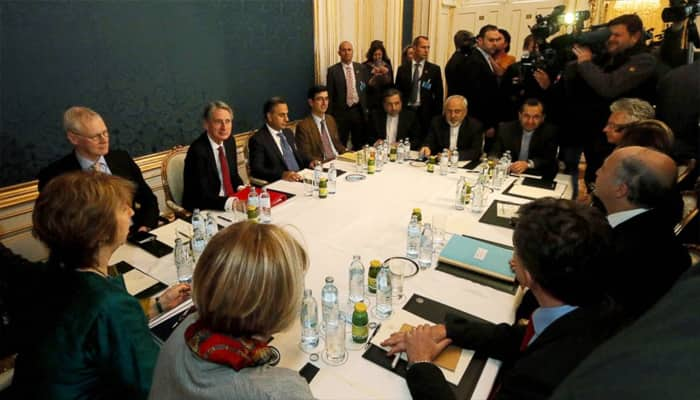Lausanne: After five days of marathon talks led by US Secretary of State John Kerry, Iranian foreign minister on Monday began negotiating with the ministers from six world powers (p5+1) to stitch up a framework agreement over the country's controversial nuclear programme ahead of the March 31 deadline.
Political temperature is set to shoot up in the cold Swiss city of Lausanne today as Iran along with six world powers (P5+1) - Russia, China, the United States, France, Britain and Germany - will negotiate over the complex details of an emerging nuke deal, which Israel's Benjamin Netanyahu has already branded as a “very bad deal”.
Just a couple of days ahead of the deadline, Netanyahu reiterated that the emerging nuclear “agreement as it appears is fulfilling our deepest fears and even worse”.
He also raked up the issue of Houthi rebels, allegedly backed by Iran, advancing in Yemen and connected it with the emerging nuclear deal, warning against the dangers of a “Iran-Lausanne-Yemen axis”.
"In parallel to the gathering for this dangerous agreement, the proxies of Iran in the Middle East are carrying out a wide occupation of Yemen.The Iran-Lausanne-Yemen axis is very dangerous to mankind and needs to be stopped," the CNN quoted him as saying.
According to a CNN report, the negotiations were “tough and intense” and the negotiators are still divided over two issues: First one being the limits to be imposed on Iran's nuclear programme and second the rate of lifting UN sanctions.
The talks between the sextet of world powers and Iran on Monday are crucial as they will play a significant role in deciding if the two sides can reach a framework agreement by tomorrow, that is March 31, the deadline.
It’s the first such session since talks were extended for seven months last November.
For the talks, EU foreign affairs minister Federica Mogherini is also in Lausanne.
Chaired #IranTalks tonight with @JohnKerry, Lavrov, Wang Yi, Steinmeier, @LaurentFabius & @PHammondMP pic.twitter.com/ru8vGB7CqC
— Federica Mogherini (@FedericaMog) March 29, 2015
Even as both sides in the talks will try their best to convicne the other to take tough decisions, Iran made it clear that “agreement and pressure” can't go together and that sanctions must be relieved as soon as the deal goes in effect.
Iranian FM Zarif tweeted that both sides must show flexibility in talks.
In negotiations, both sides must show flexibility.We have, and are ready to make a good deal for all.We await our counterparts' readiness.
— Javad Zarif (@JZarif) March 28, 2015
Iranians have already made their choice: Engage with dignity. It's high time for the US and its allies to chose: pressure or agreement.
— Javad Zarif (@JZarif) March 20, 2015
According to a BBC report, the negotiations were leading to an "understanding" rather than a formal agreement, which would form the basis of a comprehensive deal, including all technical details, to be tied up by 30 June.
Iran`s nuke programme has always been looked upon with suspicion from Western countries who doubt that Iran is pursuing nuke weapons` ambitions.
However Tehran has been denying the same, saying that its nuke overtures are only for peaceful processes.
















